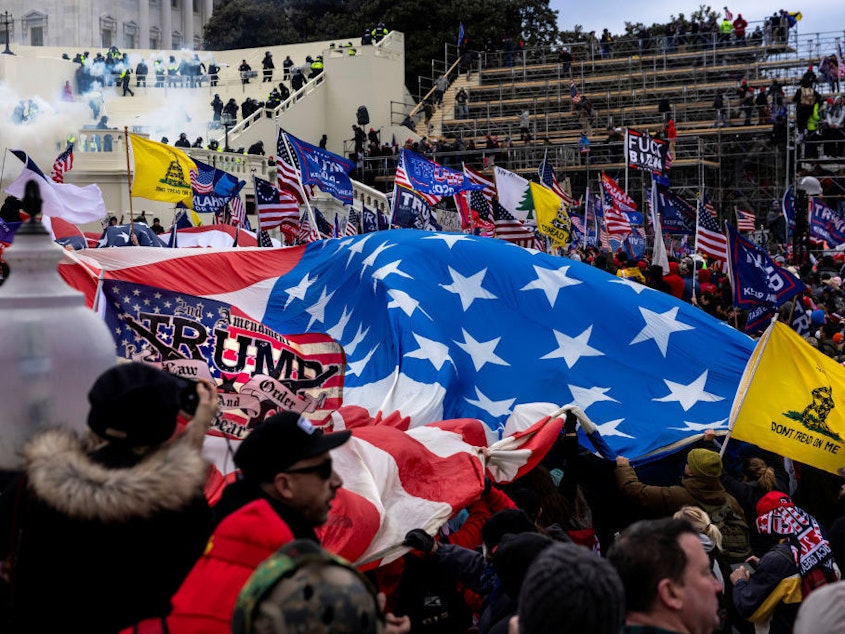'Unconscionable': Capitol Police Union Says Leadership Failed Officers In Riot

The union representing U.S. Capitol police officers says the force's leadership failed to adequately relay the known threat of violence ahead of the Jan. 6 deadly riot, calling the acting chief's recent admission of prior knowledge of the threat to Congress "a disclosure that has angered and shocked the rank-and-file officers."
The statement Wednesday from the Capitol Police Labor Committee comes a day after Acting Chief Yogananda Pittman testified to Congress, saying in prepared remarks:
By January 4th, the Department knew that the January 6th event would not be like any of the previous protests held in 2020. We knew that militia groups and white supremacists organizations would be attending. We also knew that some of these participants were intending to bring firearms and other weapons to the event. We knew that there was a strong potential for violence and that Congress was the target.
Pittman, who apologized in her testimony for her department's "failings" during the insurrection, told Congress that the former police chief, Steven Sund, had asked the Capitol Police Board, a three-member oversight body, on Jan. 4 to declare a state of emergency for Jan. 6 and to request National Guard assistance.
Pittman said the board denied both requests.
Capitol police leaders have faced stinging criticisms for not having better prepared for the violent assault by supporters of former President Donald Trump that left five people, including one police officer, dead. Additionally, the acting head of Washington, D.C.'s Metropolitan Police Department revealed on Wednesday that a second officer who responded to the attack has died by suicide since the incident occurred.
Sponsored
In the Wednesday statement, union Chair Gus Papathanasiou called the revelation that leadership had prior knowledge of the threat of violence "unconscionable."
"We have one officer who lost his life as a direct result of the insurrection. Another officer has tragically taken his own life," Papathanasiou said. "Between USCP and our colleagues at the Metropolitan Police Department, we have almost 140 officers injured. I have officers who were not issued helmets prior to the attack who have sustained brain injuries. One officer has two cracked ribs and two smashed spinal discs. One officer is going to lose his eye, and another was stabbed with a metal fence stake."
In the days after the riot, top security officials at the Capitol — including Sund; the House sergeant-at-arms, Paul Irving; and the Senate sergeant-at-arms, Michael Stenger — resigned their posts following requests from leaders of both parties.
"The disclosure that the entire executive team ... knew what was coming but did not better prepare us for potential violence, including the possible use of firearms against us, is unconscionable," Papathanasiou said. "The entire executive team failed us, and they must be held accountable. Their inaction cost lives."
The statement goes on to say that the department's high-ranking officials are unfit to take the helm as chief.
Sponsored
"We have leaders in this department who have the support of the front-line officers. They can implement the changes we need to make, but those leaders are not at the Chief or Assistant Chief level, nor possibly the Deputy Chief level," Papathanasiou said, adding later: "Our officers need leadership they can trust."
Sund, the former chief, had previously defended his handling of the riot in an interview with NPR, saying that the insurrection had been a sophisticated attempt to siege the complex.
"This was not a demonstration. This was not a failure to plan for a demonstration. This was a planned, coordinated attack on the United States Capitol," he said. [Copyright 2021 NPR]



